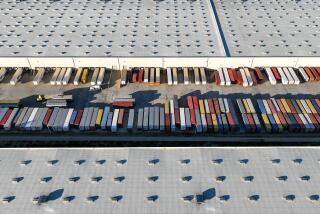State to require calorie counts
SACRAMENTO — Chain restaurants in California will have to display calorie counts with each menu item -- the first state law of its kind in the nation -- under legislation that Gov. Arnold Schwarzenegger plans to sign today.
With two days left to act on hundreds of bills, Schwarzenegger on Monday approved measures that could ease traffic in downtown Los Angeles with toll lanes, protect animal researchers from threats and smooth the effort to achieve cityhood for East Los Angeles. He rejected a proposal to remove “communism” as a reason for dismissal from state employment.
The menu labeling was proposed by state Sen. Alex Padilla (D-Pacoima) as a way to give restaurant customers more information about what they eat.
“The way Californians order food is about to change,” Padilla said in a statement. “All Californians will soon be empowered with reliable, accessible nutrition information . . . that will help them make more informed, healthier choices.”
The governor was reserving comment Monday but planned to hold a bill-signing ceremony today at a Sacramento-area Chili’s Grill and Bar, a representative said.
The new law applies to restaurants with 20 or more locations in California, which includes more than 17,000 eateries. Beginning July 1, 2009, they will be required to provide brochures containing nutritional information including number of calories and grams of saturated fat.
Starting Jan. 1, 2011, all menus and menu boards above front counters will have to include the number of calories for each item.
Padilla said the law, SB 1420, supported by the California Center for Public Health Advocacy and the American Cancer Society, is similar to one already in place in New York City.
Meanwhile, the bill affecting drivers will allow solo motorists to pay a fee to use one carpool lane in each direction on a 16.5-mile stretch of the 110 Freeway, between 182nd Street and Adams Boulevard. The same applies to the two carpool lanes in each direction along 14 miles of the 10 Freeway between Alameda Street and the 605 Freeway.
Caltrans will begin environmental studies, and the Metropolitan Transportation Authority will begin design work aimed at opening the new toll lanes by December 2010, according to Rick Jager of the MTA.
The project will be paid for with $210.6 million in federal funds, according to Sen. Mark Ridley-Thomas (D-Los Angeles), author of the measure, SB 1422.
“It accomplishes traffic congestion relief, air quality improvement and economic development,” Ridley-Thomas said Monday.
The governor has also signed a measure that could smooth the way for East Los Angeles and Rowland Heights to pursue cityhood. It deletes a July 2009 deadline for communities to complete incorporation in order to receive funding for costs associated with forming new cities.
“Communities across California have invested a lot of time and resources into forming new cities or annexing land to accommodate growth,” said Senate Majority Leader Gloria Romero (D-Los Angeles), author of the legislation. “SB 301 will provide a stable funding source so these cities can succeed.”
The governor wielded his veto pen against a measure that would have eliminated references in state law to communism as cause for dismissal of school, community college and other public employees.
“Many Californians have fled Communist regimes, immigrated to the United States and sought freedom in our nation because of the human rights abuses perpetuated in other parts of the world,” Schwarzenegger said in his veto message. “It is important particularly for those people that California maintains the protections of current law.
“Therefore,” his message said, “I see no compelling reason to change the law that maintains our responsibility to ensure that public resources are not used for purposes of overthrowing the U.S. or state government, or for communist activities.”
The bill, SB 1322, was written by Sen. Alan Lowenthal (D-Long Beach), who could not be reached for comment.
--
More to Read
Sign up for Essential California
The most important California stories and recommendations in your inbox every morning.
You may occasionally receive promotional content from the Los Angeles Times.











